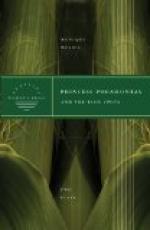“Aye,” answered the girl. “First was I angry with thee, then my heart, though I did not wish to hearken to it, made me pity thee away from thy people, even as I pitied the wildcat I loosed from his trap. My father would not list to me at first, but I plead and reasoned with him, telling him that thy friendship for us would be even as a high tide that covereth sharp rocks over which we could ride safely.”
“But what meant the songs and dances in the hut in the woods, Matoaka?”
“That was the ceremony of adoption. Thou art now the son of Powhatan and my brother. Thou wert taken into our tribe, and those were the ancient rites of our people.”
“And the journey through the woods, didst thou fear for my safety then that thou didst follow all the way?”
But Pocahontas did not answer. She would not tell him that she had still doubted her father, and that she was not sure what instructions he had given the men ordered to guide the paleface.
“Thou art like the Sun God,” said Smith with genuine feeling, “powerful to save and to bless, little sister—since I have been made thy brother. And as man may not repay the Sun God for all his blessings, no more may I repay thee for all thou hast done for me.”
Pocahontas was on the point of replying when she suddenly burst out laughing at a sight before her. Two men who were rolling a barrel of flour from the storehouse to their own home let it slip from their weakened fingers. It rolled against one of the carpenters who was standing with his back to it, and hitting against his shins, sent him sprawling. It was undoubtedly a funny sight and she was not the only one to be amused. But the man did not rise.
“Why doth he not get up?” asked Pocahontas. “He cannot be badly hurt by such a light blow from that queer-shaped thing.”
“I fear me he is too weakened by lack of food,” answered Smith, gravely.
“Hath he naught to eat?” asked the girl in wide-eyed wonder. Then as if a strange thought had just come to her: “Is there not food for all? Must thou, too, my Brother, stint thyself?”
“In truth, little Sister, our rations are but short ones and if the ship cometh not soon from England with supplies, I fear me they must be shorter still.”
“No!” she cried emphatically, shaking her head till her long braids swung to and fro, “ye shall not starve while there is plenty at Werowocomoco. This very night will I myself send provisions to thee. It hurts me here,” and she laid her hand on her heart, “to think that thou shouldst suffer.”




